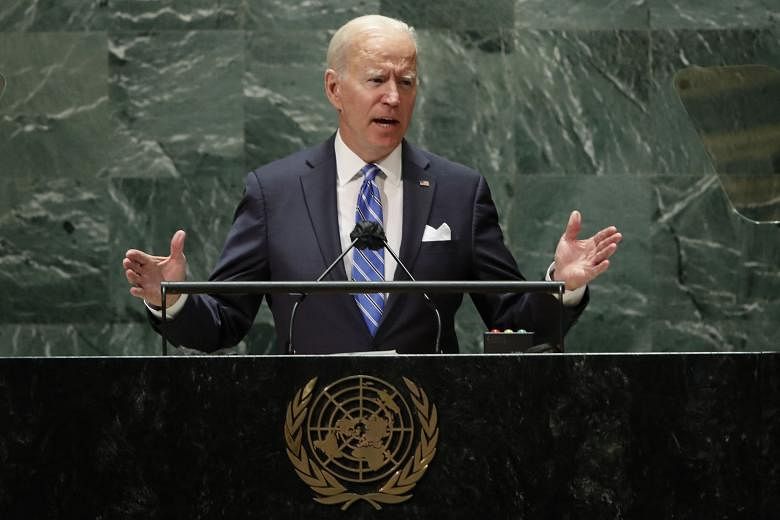NEW YORK (REUTERS) - US President Joe Biden mapped out a new era of vigorous competition without a new Cold War despite China's ascendance during his first United Nations address on Tuesday (Sept 21), promising military restraint and a robust fight against climate change.
The United States will help resolve crises from Iran to the Korean Peninsula to Ethiopia, Biden told the annual UN General Assembly gathering.
The world faces a "decisive decade," Biden said, one in which leaders must work together to combat a raging coronavirus pandemic, global climate change and cyber threats. He said the United States will double its financial commitment on climate aid and spend US$10 billion (S$13 billion) to reduce hunger globally.
Biden did not ever say the words "China" or "Beijing" but sprinkled implicit references to America's increasingly powerful authoritarian competitor throughout his speech, as the two nations butt heads in the Indo-Pacific and on trade and human rights issues.
He said the United States will compete vigorously, both economically and to push democratic systems and rule of law.
"We'll stand up for our allies and our friends and oppose attempts by stronger countries to dominate weaker ones, whether through changes to territory by force, economic coercion, technical exploitation or disinformation. But we're not seeking - I'll say it again - we are not seeking a new Cold War or a world divided into rigid blocs," Biden said.
Biden came to the United Nations facing criticism at home and abroad for a chaotic US withdrawal from Afghanistan that left some Americans and Afghan allies still in that country and struggling to get out.
'A new era'
His vow for allied unity is being tested by a three-way agreement among the United States, Australia and Britain that undermined a French submarine deal and left France feeling stabbed in the back.
Biden met Australian Prime Minister Scott Morrison in New York and was to meet British Prime Minister Boris Johnson at the White House later in the day. His staff has been trying to arrange a phone call between Biden and French President Emmanuel Macron to try to cool tempers over the submarine deal.
"We've ended 20 years of conflict in Afghanistan and as we close this era of relentless war, we're opening a new era of relentless diplomacy," Biden said.
Biden vowed to defend vital US national interests, but said that "the mission must be clear and achievable," and the American military "must not be used as the answer to every problem we see around the world".
Biden, a Democrat, hoped to present a compelling case that the United States remains a reliable ally to its partners around the world after four years of "America First" policies pursued by his Republican predecessor Donald Trump.
Republicans pounced on Biden with sharp criticism.
"President Biden's speech today does not match his actions. His failed leadership led to the chaotic and deadly withdrawal from Afghanistan that abandoned our partners, angered our Nato allies and emboldened our adversaries," said US Representative Michael McCaul, a Texas Republican.
Biden said that he remains committed to peacefully resolving a dispute with Iran over its nuclear programme. He vowed to defend US ally Israel but said a two-state solution with the Palestinians is still needed but a distant goal.
He said the United States wants "sustained diplomacy" to resolve the crisis surrounding North Korea's nuclear and ballistic missile programs. North Korea has rejected US overtures to engage in talks.
Discussing oppression of racial, ethnic and religious minorities, Biden singled out China's Xinjiang region where rights groups estimate that one million Uyghurs and other ethnic minorities have been interned in camps.
In response to Biden's reference to Xinjiang, China's mission to the United Nations, told Reuters: "It's completely groundless. We totally reject. The US should pay more attention to its own human rights problems."
UN Secretary-General Antonio Guterres, who begins a second five-year term at the helm of the world body on Jan 1, warned earlier of the dangers of the growing gap between China and the United States, the world's largest economies.
"I fear our world is creeping towards two different sets of economic, trade, financial and technology rules, two divergent approaches in the development of artificial intelligence - and ultimately two different military and geopolitical strategies," Guterres said.
"This is a recipe for trouble. It would be far less predictable than the Cold War," Guterres said.

